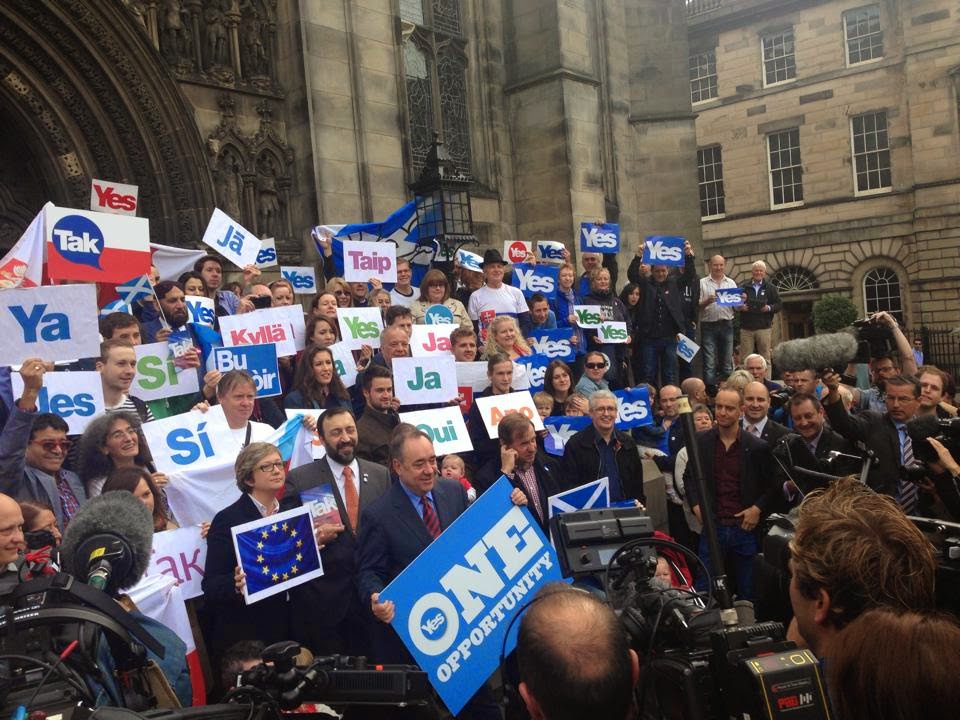The early morning mist hangs low over the polling station in Alex Salmond's Aberdeenshire constituency. This is Strichen – pronounced, unpromisingly, 'stricken' - and the first minister has just cast his vote in the village hall. He is sauntering across the damp gravel when I blurt out the question I've had in my head for three years. “Haven't you been been campaigning for a redrawing of the Act of Union, rather than independence?”
Salmond stops, leans back in surprise. “You're almost right,” he says.”I am redoing the union of the parliaments, not the union of the crowns. Of course, the United Kingdom is first mentioned as the Union of the Crowns.” He starts walking again. “I'll talk to you about this when I get chance.”
He will too. Anyone who has seen Salmond at close quarters knows there's nothing he likes better than to lecture on matters historical. Five minutes later, the first ministerial limousine is pulling away from Ritchie Hall, and I am in the back seat, absorbing a lesson on the constitution.
“You're absolutely bang on historically,” says the First Minsinster, enthusiastically. “This is re-establishing the Constitutional relationship of the 17th century – if we lose Cromwell for a second. By definition a United Kingdom comes from a Union of the Crowns (1603) not the Union of the Parliaments. (1707)”
He leans forward. “Go down to the lake, Alec,” the First Minister tells his chauffeur. The car turns left down a driveway, before rolling slowly to a halt.
The lesson recommenceth. From Salmond's point of view it seems the notion of renegotiating a treaty sounds a lot less threatening to people south of the Border, than the bolshy idea of Scots breaking away. So, in 1997, he introduced this historical angle into the first consultation documents on independence, known as the National Conversation.
The historical point proved too complex, he claims. “Apparently you have to be aware of clouding or confusing an issue, and being seen to be too clever by half. Therefore we had the straight question (on the referendum ballot paper): 'do you want Scotland to be an independent country.'”
His academic background in history explains key strands of his thinking. Salmond is, for example, an unabashed monarchist, anathema to today's Radical Independence supporters as much as it was to his left-leaning comrades in the SNP '79 Group, the cadre of young politicians formed to champion devolution in 1979.
“I argued (then) against republicanism as a policy, I thought it a daft thing to do,” he recalls. “If you were starting the constitution of a country now, it would seem anomalous to have a monarchical position.
“But my view is the monarchy epitomises the social union and in my consistent support for Queen Elizabeth as Queen of Scots, and her heirs - obviously I have deep respect for Her Majesty the Queen – I am also trying to get across the point that there is a social union beyond the Westminster Parliament.”
This “social union” - the cross-border network of family, friends and business ties – may seem an baffling concept to many south of the Border. Salmond is convinced it will be the glue that make could make new arrangements as tolerant as before.
The public meetings he held recently in Liverpool, Newcastle or Carlisle showed him articulating this comradely position, he says. “Some people accepted the point, but a lot haven't. People often see the thing through the prism of received wisdom. That will certainly change if we carry the day. I will articulate these sentiments very positively in terms of how we move forward.”
Friendly relations can persist even in the vexed area of defence. The SNP's only sine qua non, he says, is the removal of Trident. Everything else is up for negotiation. “We are perfectly happy to co-operate in anything else that is appropriate and proper”, he insists. Moreover, It would “rather anomalous” if Scotland, given its geographical position, were not allowed to join the North Atlantic Treaty Organisation.
The hand of friendship extends further. With the agreement of Westminster, Scots should be able to sign up for the Royal Regiment of Scotland, just as the Irish Guards are an integral part of the army. Similarly, British troops could be based and train in Scotland, independent or not.
A dog-walker, passes by. Weak sunlight twinkles on the lake, and the first minister, takes a moment to contemplate the political landscape in an independent country. The SNP may have won the day, but their victory is likely to reinvigorate both the radical left and the Conservative right.
“As of tomorrow, if there is a new dawn over Strichen I suppose one of the ironies is that lots of people from a variety of political positions will have great encouragement,” he says. “What could be better than having a vital representation of people's views in that first Scottish election?”
A few years ago, I tell him, a prominent banker reported a conservation with the first minister. The banker said to Salmond: “What you want from this referendum is an amicable divorce', isn't it?” Salmond replied cheerily: “And co-habitation.'”
Is the story true? “I wouldn't demean the debate in these terms.” retorts the first minister, with the possibility of a twinkle in his eye. “Can we take Mike back to the village?”


